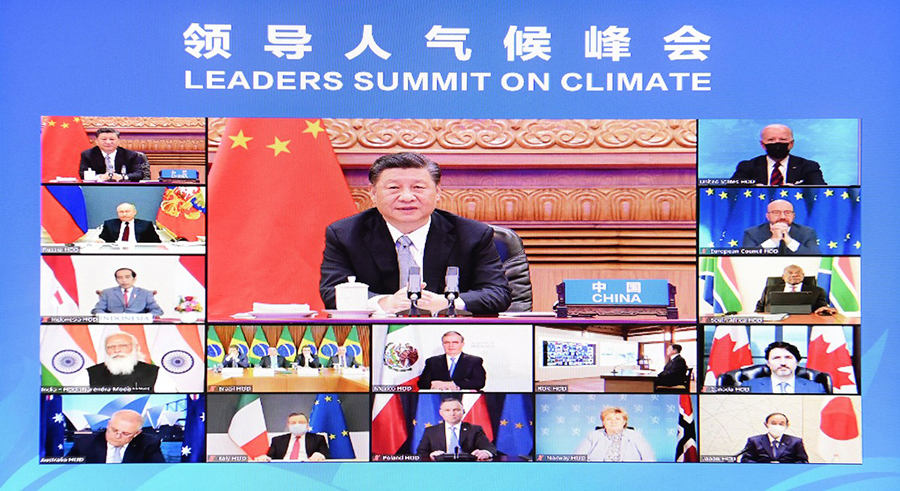
President Xi Jinping addresses the Leaders Summit on Climate via video link from Beijing on Thursday. Xi delivered an important speech titled "For Man and Nature: Building a Community of Life Together" at the two-day event hosted by the United States. [Photo/Xinhua]
By OP Rana
That all countries come together to reduce greenhouse gas emissions and shift to low-carbon, environmentally friendly development is the call of the hour.
The devastating effects of the novel coronavirus pandemic should be a stern warning, if we need one even now, that there is no time to waste. If we cannot defeat a microscopic virus to save human lives, can we save humankind from climate change if it were to reach a point of no return, which it will if we do not act now?
That's why it was heartening to see world leaders speak in one voice, albeit in different languages, at the two-day Leaders Summit on Climate organized by the United Sates that we need to drastically reduce emissions to keep global temperature rise this century to below 2 degrees Celsius to save the planet.
The global efforts to reduce emissions and shift to a green development path need not be turned into a game of political one-upmanship. US President Joe Biden's call to the world to "overcome the existential crisis of our time" is welcome. So is his pledge to reduce the US GHG emissions by 50-52 percent by 2030 from the 2005 levels and his belief that the new US goal will set it on the path to net-zero emissions by 2050, which Washington had pledged earlier.
But his pledge at the summit that began on Earth Day (Thursday) came with a catch: that other countries now needed to also raise their climate ambitions.
Other countries do need to raise their game, but to what extent should be for them to decide. For to promote cooperation on climate change, and pave the way for the implementation of the Paris Agreement, the principle of common but differentiated responsibilities, as laid down in the Kyoto Protocol, must be upheld and the concerns of developing and least-developed countries on capital, technology and capacity building be addressed.
For years, developing countries have been worried that their need for financial aid to mitigate and adapt to the climate crisis will not be met, because the $100 billion a year climate finance they were promised from 2020 at the 2009 UN Climate Change Conference in Copenhagen was not met last year despite being reiterated in the 2015 Paris Agreement.
True, the pandemic has put increasing financial pressure on the rich countries that were supposed to provide the climate finance, but for the least-developed countries, struggling under the impact of the pandemic, the situation is even grimmer-the pandemic-induced global recession has battered their economies and they face mounting debt as the cost of finance has increased.
To be honest, the Biden administration has asked Congress to approve $2.5 billion in overseas climate funding, including $1.2 billion for the Green Climate Fund. But that will only correct the wrongs of the Donald Trump administration, which suspended the payment of $2 billion of the $3 billion the Barack Obama administration had promised to the Green Climate Fund and paid only $1 billion.
The world knows the fight against climate change cannot be won unless the US and China work together, especially because China, along with India, represents the developing world, and China has been playing a leading role in reducing emissions, generating clean energy and treading the green development path since Trump announced the withdrawal of the US from the Paris Agreement. Yet despite giving a joint call to tackle the climate crisis, Biden has not shown any signs of changing the US' China policy.
The fraught relationship between the two largest economies and biggest emitters, with fears of a new Cold War on the rise, is good for neither the efforts to overcome the climate crisis nor to meet other global challenges, future pandemics included.
Biden's tone may seem discreet compared with his "America first"-obsessed predecessor, yet the apparently candid but in reality confrontational Sino-US dialogue in Anchorage, Alaska, last month reflected the tensions between the two major global players, and the onus to defuse the tensions now lies squarely with the US administration because China has publicly announced that it is ready to work with the rest of the world, the US included, to tackle the climate crisis and other global challenges.
It is in this spirit of global unity that President Xi Jinping, while addressing the Leaders Summit on Climate on Thursday, called for global efforts to deliver social equity and justice in the course of green transition. The environment concerns the well-being of people in all countries, he said, and that's why it is necessary to realize harmony between human beings and nature.
Humankind's future depends on whether we shoulder our responsibility to live in harmony with nature. China has been shouldering its responsibility by drawing upon the ancient Chinese notion of unity of nature and humans to build an ecological civilization.It is time now for all countries to come together and make genuine efforts to cool the planet. As UN Secretary-General Antonio Guterres said at the summit: "We need a green planet-but the world is on red alert. We are at the verge of the abyss. We must make sure the next step is in the right direction."
And the right direction is not in business-as-usual. Nor is it in continuing to weigh the gains of green development in terms of money.
The author is a senior editor with China Daily.

 中文
中文



